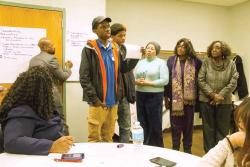February 18, 2016
 Teens who are part of the Violence Intervention Prevention initiative discussed their project at a meeting at the Mattapan Center for Life last week. Caleb Nelson photo
Teens who are part of the Violence Intervention Prevention initiative discussed their project at a meeting at the Mattapan Center for Life last week. Caleb Nelson photo
On an icy night last week, a group of Mattapan teenagers gathered inside the Mattapan Center for Life on River Street to discuss ways they can help stem the flow of displacement of long-time residents.
Meeting organizer Cynthia Lewis of Mattapan United said the event was one in a series of meetings that are aimed at empowering residents to speak up about their fears of being forced out of Boston and into lower cost suburbs.
“It’s community taking leadership,” Lewis said. “Gentrification means that more money comes into the community, the community grows in wealth. The flip side of that is that things go up in price, and now the folks that are in the community are priced out.”
Mattapan United has developed seven action strategies to address the issue of displacement head on: strengthen community bonds; encourage business development; expand affordable housing; make the neighborhood safer; open up green spaces; increase job opportunities for youth; improve the health of residents.
About 30 residents attended this meeting—a follow up to last month’s sometimes-raucous discussion in the same place on the same topic—to map a path forward and also to hear from Mattapan youth who organized to figure out their own new strategies.
Arthur Kitty, who heads up the Mattapan-based Violence Intervention-Prevention Initiative, led a discussion with seven high school students from Mattapan who have been hired by the Department of Youth Engagement and Employment as citizen journalists. They are collecting data from Boston residents in underserved neighborhoods. The initiative is run by the Boston Public Health Commission.
The goal, Kitty said, is to provide after school opportunities for young people, and also to engaging in discourses on issues like, “abandoned lots that may attract negative energy, abandoned homes that may attract negative energy, just listening to the community and some of the concerns that they have.”
“They’ll be approaching residents, service providers and other people in the community and asking them questions that they came up with. They range from: What do you like about Mattapan? How long have you lived in Mattapan? Are you fearful of our young people?” Kitty said.
One of the teens is Ahlana Williams, who took the lead in introducing VIP as, “Youth leaders involved in civic engagement and journalism, who want their voice to be heard as the youth of Mattapan at meetings like this.”
“We are those seven youth leaders who get up and voice their opinion for the rest of the youth who maybe were afraid to voice their opinion or thought that their opinions wouldn’t matter,” Williams said.
“We want that myth that Mattapan schools aren’t good enough to be abolished. We want people to strive to send their kids to Mattapan. We want to show how educated and how strong minded and intelligent that our students are,” she said.
The meeting broke out into groups, each led by a couple of the teens. Discussions revolved around spreading positive vibes throughout Mattapan, in the teen center and the library, encouraging healthy eating habits, fitness and smoke free housing. On the policy end, the teenagers asked for help lobbying elected officials to fund quality education across the board and to improve public transportation.
Mattapan United is five years into their effort to build community in Mattapan. For more information, and to get involved, visit mymattapan.org.


